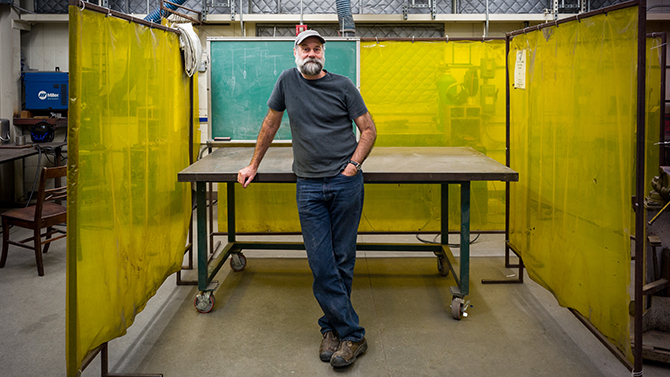


Joy of collaboration
Photo by Evan Krape October 25, 2016
UD art professor creates set pieces for Shakespeare play tour
The vision and vitality of William Shakespeare's plays continue to resonate with audiences some 400 years after the playwright's death in 1616.
Several recent programs and exhibitions at the University of Delaware also have paid tribute to the bard, including "First Folio: The Book That Gave Us Shakespeare," which was on view from late August to September at the Old College Gallery, and “Shakespeare Through the Ages,” which remains on view through Dec. 12 at the Morris Library in conjunction with associated presentations.
In November, the Delaware Shakespeare Festival will present Pericles, Prince of Tyre, at several venues throughout the First State as part of its inaugural community tour with an assist from a University of Delaware faculty member.
Pericles was the leader of Athens from 460-429 B.C. who organized the construction of the Parthenon and developed a democracy based on majority rule.
David Meyer, UD associate professor of art and design, has designed several set pieces for the production to help convey the world of the famous Greek statesman to contemporary audiences.
"I got involved in this for the joy of collaborating with others," Meyer said. "I liked the idea because I knew it was going to be challenging to create set pieces on performing spaces situated only six or eight feet from the audience."
Because performances will be held a variety of community settings, Meyer's creations had to be interesting, portable and capable of being reconfigured to represent every scene in the play.
"The director gave me a list of set pieces that the wanted," Meyer said. "These included three stools strong enough for cast members to sit on, as well as a casket that also had to function as a large table and a shrine."
Settings include ships at sea, a temple to a goddess and a table for a lavish dining hall, Meyer said.
"Sculptors think in terms of pictures," Meyer said. "I usually take a visual idea and spin it around in my head until I come up with some kind of a design."
A spirited reading of the play by cast members generated further ideas for creating pieces that would connect audiences to what was happening on stage, Meyer said.
"I came up with concepts that might convey a certain sense of rigidity or solidness," Meyer said. "I also wanted a certain fluidity in the way that the casket and the stools are shaped."
Meyer said he chose steel because that material has a structural and permanent quality and allowed him to draw on his experience as a sculptor.
The models were fashioned from steel strappings, the kind used to secure boxes, manipulated into the final forms of the set pieces, Meyer said.
"You have to persevere and do a kind of dance with the material," Meyer said. "You have your ideas and the material has ideas of its own as well."
Meyer recalled that he found it exciting and challenging to watch his original concepts evolve into the finished pieces.
"It was a great experience," Meyer said. "The complete process truly is about the arts and the sciences, because you take an artistic vision and then use science to manipulate the available materials and maybe come up with some new ideas along the way."
The music, written by Delaware musician Joe Trainor, adds another dimension of atmosphere to contributions of the others involved in the process, Meyer said.
The play will also be performed inside community centers, homeless shelters, detention facilities and others locations where people have limited access to the arts.
Paid public performances of Pericles Prince of Tyre will be held on Nov. 12-13 and Nov. 19-20 at the Delaware History Museum, 504 N. Market St., Wilmington.
"I like the idea that the people putting on the play are part of a Delaware organization and I love the commitment they are making to the people who will be seeing the play," Meyer said. "It's about seeing community and culture and encouraging a conversation about these things in a different medium."
For more information about the Delaware Shakespeare Festival and performance dates, visit the website.
Contact Us
Have a UDaily story idea?
Contact us at ocm@udel.edu
Members of the press
Contact us at 302-831-NEWS or visit the Media Relations website

